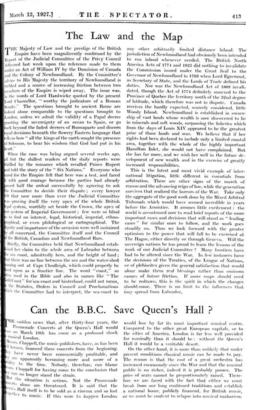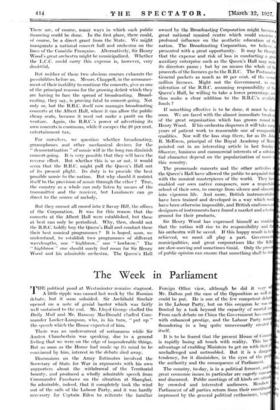Can the B.B.C. Save Queen's Hall ?
111E sudden news that, after thirty-four years, the Promenade Concerts at the Queen's Hall would (Ise on March 19th has come as a profound -shock musical London. Messrs. Chappell,th-e music-publishers, have, as has been II known, financed these concerts from the beginning.
have never beew commercially profitable; and (T. are apparently becoming more and more of a }"IltY to the firm. Nobody, therefore, can blame .ssrs. Chappell for having come to the conclusion that ey can no longer stand the strain. BO the situation is serious. Not the Promenade neerts alone are- threatened. It is • said that the nail itself is. to be sold- as a cinema and so lost ogether to music. If this were to happen- London would lose by far its most important musical centre. Compared tO the other great European capitals, or. to the cities of America, London is far less well provided for musically than it should 'be : • without the Queen's Hall it would be a veritable desert.
On the other hand, it is more than unlikely that under present conditions classical music can be made to pay. The reason is that the cost of a great orchestra has increased enormously since the War and that the musical public is no richer, indeed it is probably poorer. The price- of seats cannot -be proportionately raised. There- fore we • arc faced with the fact that either we must break from our long confirmed traditions and establish a national home, publicly financed, for British music, or we must be content to relapse into musical barbarism. There are, of course, many ways in .which such public financing could be done. In the first place, there could, of course, be a direct grant from the State. We might inaugurate a national concert hall and orchestra on the lines of the Comedie Francaise.. Alternatively, Sir Henry Wood's great orchestra might be municipalized. Whether the L.C.C. could carry this expense is, however, very doubtful.
But. neither of these two obvious courses exhausts the possibilities before us. Messrs. Chappell, in the announce- ment of their inability to continue the concerts, give as one of the principal reasons for the growing deficit which they arc having to face the spread of broadcasting. Broad- casting, they say, is proving fatal to concert-going. Not only so, but the B.B.C. itself now manages broadcasting concerts at the Albert Hall, where it can allow the public cheap seats, because it need not make a profit on the venture. Again, the B.B.C.'s power of advertising its own concerts is enormous, while it escapes the 20 per cent. entertainment tax.
-For ourselves, we question whether broadcasting, gramophones and other mechanical devices for the " democratization " of Music will in the long run diminish concert-going. It is very possible that they will have the reverse effect. But whether this is so or not, it would seem that the B.B.C. might pull the Queen's Hall out of its present plight. its duty is to provide the best possible music to the nation. But why should it restrict itself to the provision of music through the ether ? True, the country as a whole can only listen by means 'of the transmitter and the receiver, but Londoners- can go direct to the source of melody.
But they cannot all crowd into 2 Savoy Hill, the offices of the Corporation. It was for this reason that the concerts at the Albert Hall were established, but these at best can only be periodical. Why, then, should not the B.B.C. boldly buy the Queen's Hall and conduct there their best musical programmes ? It is hoped, soon, we understand, to establish two programmes of different wavelengths, one "highbrow," one "lowbrow." The " highbrow " one should surely find room for Sir Henry Wood and his admirable orchestra. The Queen's Hall owned by the Broadcasting Corporation. might become a great national musical _centre which could exercise a profound influence on the aesthetic education of tit nation. -The Broadcasting Corporation, we believe, presented with a great opportunity.' It may be thought that the- expense and risk of loss in conducting a great auxiliary. enterprise such as the ,Queen's. Hall may Blake its directors pause. ; but by no means the whole of the proceeds of the licences go to the B.B.C. The Postmaster. General pockets as much as 40 per cent. of the secon million licences. Might not the Government, in cm sideration of the B.B.C. assuming responsibility of it Queen's Hall, be willing to take a lower, percentage, and thus make a clear 'addition to- the • B:B.C:'s availab funds ?
If something effective is to be done, it must be du soon. We are faced with the almost immediate break-u of the great organization which has grown round S' Henry Wood. If his orchestra disperses it will take Mal years of patient work to reassemble one of comparab qualities. Nor will the loss stop there,. for as Dr. Jo B. McEwen, principal of the Royal Academy of Music pointed out in an interesting article in last Sunday' Observer, business and commercial interests of a substa tial character depend on the popularization of music this country.
The promenade concerts and the other activities the Queen's Hall have allowed the public to acquaint it with the musical masterpieces of the world. They btu enabled our own native composers, now a respeetab school of their own, to emerge from silence and obseurit into vigorous life. And more, British instrumentali have been trained and developed in a way which wet have been otherwise impossible, and British craftsmen a designers of instruments have found a market and a testi ground for their products.
Sir. Henry Wood has expressed himself as confide that the nation will rise to its responsibility and t his orchestra will be saved. If this happy result is to achieved, we must all play a part. Governinen municipalities, and great corporations like the 11.11 are slow-moving and sometimes timid. Only the press of public opinion can ensure that something shall be do































































 Previous page
Previous page